The Red Sox came to a contract with Rafael Devers for 2023
Red Sox Nation collectively held its breath when it began reading the tweet from ESPN’s Jeff Passan. “Third baseman Rafael Devers and the Boston Red Sox are in agreement on … .”
Then our hearts collectively sank as we realized Passan wasn’t dropping a bomb about a massive long-term extension that we’ve been yearning for. Instead, the Red Sox agreed to a one-year, $17.5 million deal with Devers to avoid arbitration.
Third baseman Rafael Devers and the Boston Red Sox are in agreement on a one-year, $17.5 million deal to avoid arbitration, sources tell ESPN.
— Jeff Passan (@JeffPassan) January 3, 2023
This does not stop the sides from reaching a long-term contract extension. The fact that the sides got this deal done shows discussions.
It isn’t the news fans have been anxiously awaiting but it is a positive sign in regard to the relationship between the Red Sox and their superstar third baseman.
As Passan points out, the one-year deal does not prevent the sides from continuing to discuss a long-term contract. Reaching an agreement on his 2023 salary relatively early in the process is a promising sign. The Red Sox went down to the wire with Devers last year, avoiding arbitration with a one-year, $11.2 million deal in March.
The lockout certainly played a part in the delay but there was still some tension over the gap in value between the two sides that threatened to place the decision in the hands of an arbitration panel. Wrapping up these negotiations long before the deadline shows the team is on the same page as Devers regarding his value for next season.
The arbitration process can be awkward and uncomfortable. Teams are essentially tasked with convincing a panel of unbiased participants why the player isn’t worth as much as he values himself. Obviously, this outcome would have been counterproductive to any long-term extension negotiations. The Red Sox dodged that bullet with plenty of time to reignite talks about the future.
The $17.5 million salary lands slightly above the $16.9 million that MLB Trade Rumors projected for Devers. This may indicate that the exploding free-agent market has led to a rise in how star players are valued, which has trickled down to arbitration-eligible players. It also shows that the Red Sox are willing to go above and beyond to pay a bit more than expected to appease their best player.
There’s no doubt that the Red Sox are willing to pay top dollar for their star players in the short term. They offered Mookie Betts a deal with an average annual value of $30 million. They were willing to pay Xander Bogaerts more per season than the deal he signed with the San Diego Padres.
Boston let both stars slip away because they weren’t willing to commit enough years. Their best offers appeared embarrassingly low in terms of total dollars because Red Sox ownership has never shown any desire to approve a deal that would last over a decade.
Boston can’t afford to make the same mistake with the 26-year-old Devers. Even if he is demanding a deal that runs into his late-30s, the team is getting more prime years from a player Raffy’s age than they would from one who is already entering their 30s. There could be some rough years on the back end of the deal but in this scenario, you bite the bullet and risk it.
The trend emerging across the league in recent years has seen teams throw massive long-term deals at star free agents, adding on more years in order to lower the average annual value. This is their way of circumventing the luxury tax rules by creating a few million dollars in wiggle room beneath the threshold. The Red Sox haven’t caught on to this trend and their stubborn refusal to adapt has become a failure of epic proportions.
About a year ago, Devers reportedly rejected an offer similar to the 8-year, $168 million deal that Matt Olsen signed with the Atlanta Braves. The floor was raised when the Braves inked star third baseman Austin Riley to a 10-year, $212 million contract. Given the similarities with Riley in age and production, the Red Sox must have realized they were going to need to top that deal in order to keep Devers.
The mammoth deals that Aaron Judge, Trea Turner, and other star free agents received this offseason further changed the landscape. If Bogaerts, who is four years older than Devers, got $280 million free agency, the Red Sox shouldn’t even bother opening negotiations with anything less than $350 million.
The Red Sox backed themselves into a corner that forced them to trade Betts in a deal that didn’t bring back much beyond financial relief. They let Bogaerts slip away for a measly compensation pick after the fourth round because they failed to adapt to the market and foolishly paid the luxury tax for a last-place team.
Devers has little incentive to sign an extension unless they offer him the moon plus prove to him that they are willing and able to build a contender around him. After losing so many homegrown stars, Boston needs to do whatever it takes to convince Devers. If they blow this with their All-Star third baseman, the backlash will be deafening.
It remains to be seen if the Red Sox have learned their lesson but at least they are moving in the right direction. By not dragging out the process of negotiating with the arbitration-eligible Devers about his 2023 salary, the Red Sox have ensured that they haven’t further damaged their relationship by haggling over his current value while leaving themselves enough time before the season begins to hash out a long-term agreement.
